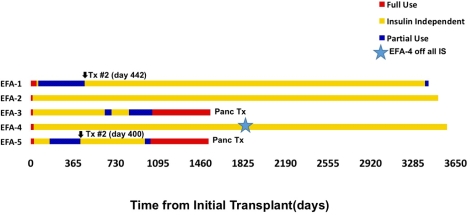Ten Year Follow-Up of Islet Recipients on Anti-LFA1 Therapy: Over-Immunosuppression Leads to Operational Tolerance?
1Surgery, University of California, San Francisco, San Francisco, CA
2Endocrinology, University of California, San Francisco, San Francisco, CA.
Meeting: 2018 American Transplant Congress
Abstract number: 485
Keywords: Immunosuppression, Islets, LFA-1 antigen, Tolerance
Session Information
Session Name: Concurrent Session: Pancreas and Islet - 2
Session Type: Concurrent Session
Date: Tuesday, June 5, 2018
Session Time: 2:30pm-4:00pm
 Presentation Time: 3:30pm-3:42pm
Presentation Time: 3:30pm-3:42pm
Location: Room 4C-3
Introduction: Ten-year outcomes from a cohort of five pre-uremic islet transplant (txp) recipients treated with anti-leukocyte functional antigen-1 (LFA-1) antibody Efalizumab (EFA) revealed two patients that remain insulin independent with either minimal or complete withdrawal of immunosuppression (IS), prompting investigation of underlying immunologic mechanisms.
Methods: Patients remained on EFA following islet infusion until drug discontinuation on May 1, 2009 (avg treatment 570 days), with transition to CNI-sparing IS. Blood samples were monitored pre- and post-txp for CD4+, CD8+, and regulatory T (Treg) cells. Recipient alloreactivity was evaluated by mixed lymphocyte reactions (MLR) in vitro against donor-specific and third-party stimulated B cells (sBc) for proliferation and cytokine production.
Results/Discussion: Insulin independence at 10 years post-txp was 40% (2/5 patients; Fig 1). Two patients, EFA-2 and EFA-4, remain insulin-independent on minimal to no IS, while a third patient, EFA-1, maintained insulin independence for 3287 days. All five pts showed significant enrichment of peripheral Tregs; notably EFA-4, who remains insulin independent off all IS for 5.4 years, had the highest peak levels of Treg-predominance, reaching 67% of all CD4+ T cells in circulation. Further investigation by proliferation and interferon gamma production after MLR revealed that EFA-2 and EFA-4 had an extended period of non-reactivity to donor and third-party antigen on EFA. Although EFA-4 regained in vitro reactivity to both donor and third party antigen after discontinuation of EFA, the patient remains operationally tolerant and insulin independent off all IS.
Conclusions: In ten-year follow up of islet txp recipients on EFA-based IS, one patient achieved operational tolerance off all IS, with another maintaining insulin independence on minimal IS. Selective enrichment of Tregs and sustained early donor non-reactivity while on EFA correlate with these outcomes.
CITATION INFORMATION: Gardner J., Posselt A., Wisel S., Mashirani U., Szot G., Nguyen V., Johnson K., McElroy J., Tang Q., Stock P. Ten Year Follow-Up of Islet Recipients on Anti-LFA1 Therapy: Over-Immunosuppression Leads to Operational Tolerance? Am J Transplant. 2017;17 (suppl 3).
To cite this abstract in AMA style:
Gardner J, Posselt A, Wisel S, Mashirani U, Szot G, Nguyen V, Johnson K, McElroy J, Tang Q, Stock P. Ten Year Follow-Up of Islet Recipients on Anti-LFA1 Therapy: Over-Immunosuppression Leads to Operational Tolerance? [abstract]. https://atcmeetingabstracts.com/abstract/ten-year-follow-up-of-islet-recipients-on-anti-lfa1-therapy-over-immunosuppression-leads-to-operational-tolerance/. Accessed February 24, 2026.« Back to 2018 American Transplant Congress

